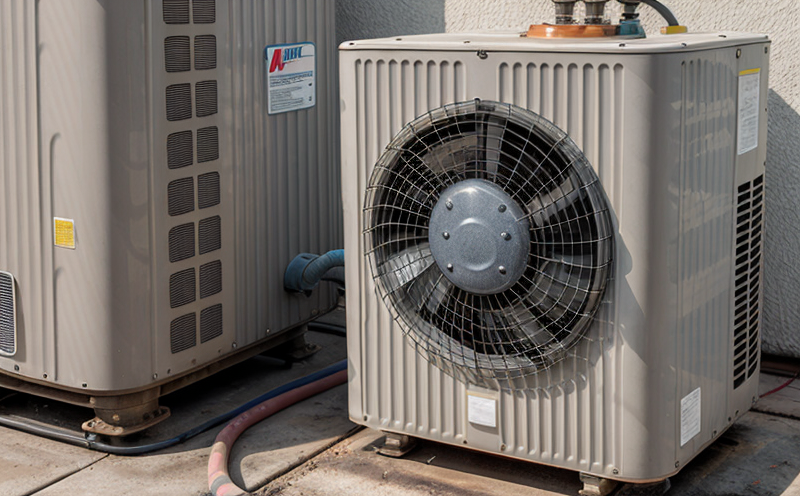Measuring Condensation Effects on HVAC Components Over Time
Measuring Condensation Effects on HVAC Components Over Time A Crucial Service for Businesses
As the world becomes increasingly aware of the importance of indoor air quality and energy efficiency, businesses are seeking innovative solutions to optimize their Heating, Ventilation, and Air Conditioning (HVAC) systems. One critical aspect of maintaining these complex systems is understanding the condensation effects on HVAC components over time. At Eurolab, we specialize in providing a cutting-edge laboratory service that measures condensation effects on HVAC components, empowering businesses to make informed decisions about their equipments performance.
What is Measuring Condensation Effects on HVAC Components Over Time?
Condensation effects on HVAC components refer to the accumulation of moisture on surfaces within air conditioning and heating systems. This phenomenon can lead to a range of issues, including corrosion, reduced system efficiency, and increased energy consumption. Over time, condensation effects can compromise the integrity of critical system components, resulting in costly repairs or even system failure.
Measuring Condensation Effects on HVAC Components Over Time involves simulating real-world operating conditions within our state-of-the-art laboratory facilities. Our expert technicians subject test samples to various temperature and humidity cycles to accurately assess their performance under different condensation scenarios. This comprehensive analysis provides valuable insights into the effects of condensation on system components, enabling businesses to predict potential problems and take proactive measures to prevent them.
Advantages of Measuring Condensation Effects on HVAC Components Over Time
Using Eurolabs laboratory service for measuring condensation effects on HVAC components offers numerous benefits, including
Prevents System Failure By identifying potential issues early on, businesses can avoid costly repairs or even system replacement.
Reduces Energy Consumption Understanding the impact of condensation on system efficiency enables businesses to optimize their equipment settings and minimize energy waste.
Extends Equipment Lifespan Regular maintenance and informed decision-making through condensation analysis help extend the lifespan of critical system components.
Enhances Indoor Air Quality By understanding how condensation affects HVAC components, businesses can take measures to maintain optimal indoor air quality, improving occupant health and comfort.
Meets Regulatory Compliance Our service helps businesses ensure compliance with industry regulations and standards related to energy efficiency and indoor air quality.
Additional benefits of our laboratory service include
Cost Savings By identifying and addressing potential issues proactively, businesses can avoid expensive repairs or replacements.
Improved System Performance Understanding condensation effects enables businesses to optimize system settings for peak performance.
Data-Driven Decision Making Our comprehensive analysis provides actionable insights that inform business decisions about equipment maintenance, upgrades, or replacement.
Competitive Advantage Businesses that prioritize indoor air quality and energy efficiency can differentiate themselves from competitors and attract customers seeking sustainable solutions.
QA Measuring Condensation Effects on HVAC Components Over Time
Q What types of HVAC components are typically affected by condensation effects?
A Commonly affected components include evaporator coils, condenser coils, fan motors, and air handlers.
Q How do you simulate real-world operating conditions in the laboratory?
A Our expert technicians use specialized equipment to replicate various temperature and humidity cycles that mimic actual system operation.
Q Can this service be used for both new and existing HVAC systems?
A Yes! Our laboratory service is suitable for both new installations and ongoing maintenance of existing systems.
Q How long does the analysis process typically take?
A The duration of our analysis depends on the specific requirements of each project. Typically, results are available within 1-3 weeks after sample receipt.
Q Are there any specific preparation or documentation requirements for submitting samples?
A Yes! We require a detailed description of the system and its components, as well as relevant technical specifications and operating data.
Conclusion
Measuring Condensation Effects on HVAC Components Over Time is an essential service that empowers businesses to optimize their systems performance, reduce energy consumption, and ensure compliance with industry regulations. At Eurolab, we offer a comprehensive laboratory service that simulates real-world operating conditions to provide actionable insights into condensation effects on critical system components. By partnering with us, businesses can make informed decisions about equipment maintenance, upgrades, or replacement, ultimately driving cost savings, improved efficiency, and enhanced indoor air quality.
Dont let condensation effects compromise your businesss success. Contact Eurolab today to learn more about our laboratory service for measuring condensation effects on HVAC components over time.




